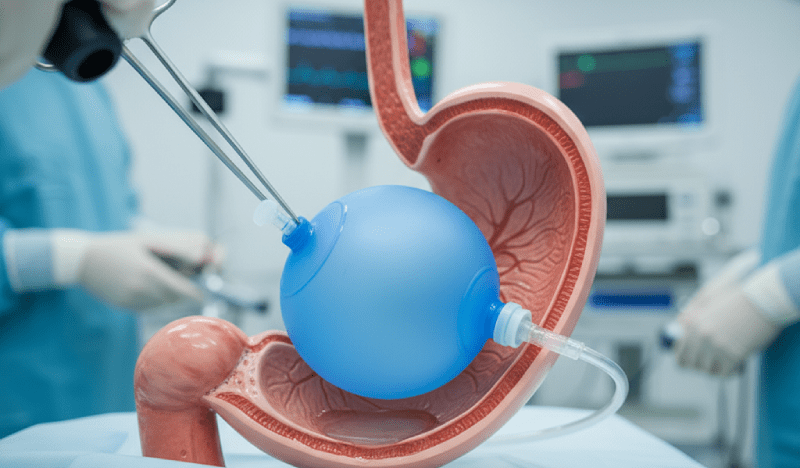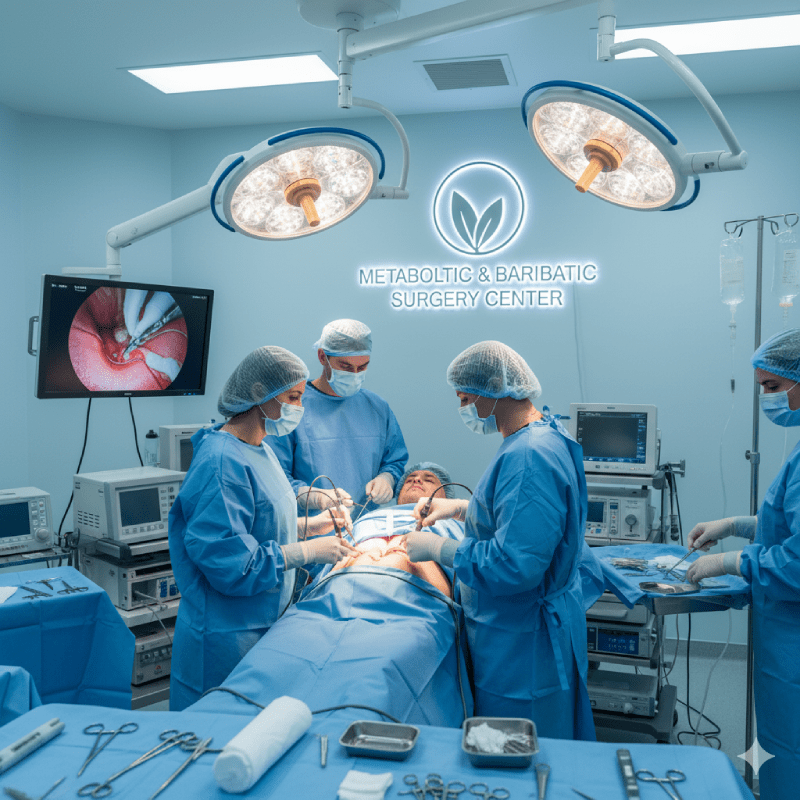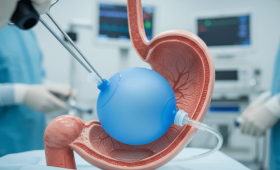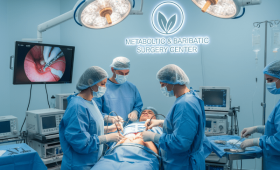What is Gastric Botox and How is it Applied?
Gastric botox is a non-surgical weight loss procedure applied with an endoscopic method. In this method, botulinum toxin is injected into specific muscle regions of the stomach using a special endoscope. This toxin temporarily reduces the contraction ability of the stomach muscles and prolongs the stomach’s emptying time. This allows the person to feel full for a longer period, reduces their appetite, and helps them lose weight by eating less. The procedure takes approximately 15-20 minutes and does not require general anesthesia, being performed under light sedation.
Who is Gastric Botox Suitable For?
Gastric botox is a suitable method for individuals who are overweight but do not fall into the morbidly obese category. It is generally preferred by people with a Body Mass Index (BMI) between 27 and 40 who do not want to undergo surgery and are looking for support in their weight loss journey. It is ideal for patients who have difficulty losing weight with diet and exercise but do not have a serious obesity problem. This procedure is not suitable for individuals with stomach conditions such as stomach ulcers or gastritis, an allergy to botulinum toxin, or those who are pregnant. A professional medical evaluation is required before the application.
Is Gastric Botox a Permanent Solution?
Gastric botox is not a permanent weight loss method. The effect of the botox substance generally lasts between 4 and 6 months. At the end of this period, the effect of the botox gradually disappears, and the stomach muscles return to their normal function. Therefore, gastric botox should be seen as a starting point, and the healthy eating habits gained during this process should be made permanent. The procedure can be repeated for the continuation of the weight loss process, but this decision should be made under the supervision of a doctor.
What is a Gastric Balloon and How is it Placed?
A gastric balloon is a silicone device placed in the stomach endoscopically, using a non-surgical method. After being placed, it is filled with a special liquid (usually saline) to occupy a portion of the stomach’s volume. This allows a person to reach a feeling of fullness by consuming less food and to start losing weight. The gastric balloon is a temporary weight loss method. It is an ideal option for individuals who do not want to have surgery but are looking for effective support.
Who is a Gastric Balloon Suitable For?
Gastric balloon application is generally ideal for patients with a Body Mass Index (BMI) of 30 to 40 who are not suitable for surgery or do not want surgical intervention. This method can also be used as a starting point in obesity treatment or can be preferred to provide initial weight loss in preparation for surgery. Before the application, the patient’s general health status and stomach structure are evaluated with an endoscopy. It is not suitable for people with problems in their stomach or intestinal system.
How Long Does the Gastric Balloon Last?
The effect of the gastric balloon varies depending on the type of balloon used. Gastric balloons are generally designed to remain in the stomach for 6 to 12 months. At the end of this period, the balloon must be removed from the stomach. During the time the balloon remains in the stomach, the patient is expected to make changes in their diet and lifestyle under the supervision of a dietitian and doctor. Continuing these habits after the balloon is removed is of critical importance for maintaining the lost weight.
What are the Differences Between Gastric Botox and Gastric Balloon?
Gastric botox and gastric balloon, while both being non-surgical methods, work with different mechanisms. Gastric botox paralyzes the stomach muscles, slowing down digestion and increasing the feeling of fullness. The gastric balloon, on the other hand, physically fills the stomach, limiting food intake. The effect of botox generally lasts for 4-6 months, while the balloon can stay in the stomach for 6-12 months. An endoscopic procedure is sufficient for botox, while the balloon requires endoscopic intervention for both placement and removal.
What is Sleeve Gastrectomy?
Sleeve gastrectomy is one of the most commonly applied methods in obesity surgery. In a laparoscopic (closed) surgical procedure, approximately 80% of the stomach is removed, and the stomach is transformed into a banana-shaped tube. This reduces the stomach volume, and the person reaches a feeling of fullness with less food. Additionally, since the fundus part of the stomach, where the hunger hormone ghrelin is secreted, is also removed, the patient’s appetite decreases significantly. This surgery offers a permanent solution.
Who is Sleeve Gastrectomy Suitable For?
The general criterion for sleeve gastrectomy is individuals with a Body Mass Index (BMI) of 40 or higher. People with a BMI between 35-40 who have serious co-morbidities related to obesity such as diabetes, hypertension, or sleep apnea are also suitable candidates for this surgery. It is also important that the patient does not have a chronic illness that would prevent the surgery and is psychologically ready for the process.
What is Gastric Bypass Surgery?
Gastric bypass is a combined obesity surgery that both reduces stomach volume and bypasses a portion of the small intestine. In this surgery, a large part of the stomach is bypassed to create a small gastric pouch, and this pouch is connected to the lower part of the small intestine. This both restricts food intake and reduces the absorption of nutrients. This procedure is generally preferred in patients with a very high BMI or metabolic diseases such as type 2 diabetes.
Who is Gastric Bypass Suitable For?
Gastric bypass surgery is generally suitable for individuals with a Body Mass Index (BMI) of over 40 or those with a BMI between 35-40 who have serious co-morbidities related to obesity (especially uncontrolled type 2 diabetes). This surgery is often recommended for patients who want to control their diabetes, as it is very effective on this condition. Pre-operative general health status and endocrinological evaluations are performed.

What are the Differences Between Sleeve Gastrectomy and Gastric Bypass?
While sleeve gastrectomy only reduces the volume of the stomach, gastric bypass both reduces the volume and decreases absorption. In sleeve gastrectomy, the digestive system continues its natural flow, while in bypass, nutrients skip a portion of the small intestine. This can lead to faster weight loss and more effective results on diabetes in bypass surgery, but it also increases the risk of vitamin and mineral deficiencies. Both surgeries are permanent.
Do Weight Loss Surgeries Provide Permanent Weight Loss?
Yes, weight loss surgeries provide permanent weight loss, but this is not solely a result of the surgery. Surgeries are powerful tools that facilitate the weight loss process. The real success is achieved by the patient changing their lifestyle and adopting new eating habits. While patients lose weight rapidly thanks to the restrictions and metabolic changes provided by the surgery, the responsibility for maintaining a healthy life and preserving the lost weight in the long term belongs to them.
What Kind of Preparation Process is Required Before Surgery?
There is a comprehensive evaluation process before obesity surgeries. This process includes the evaluation of specialists from different branches such as internal medicine, cardiology, psychiatry, endocrinology, and a dietitian to understand the patient’s general health status. Blood tests, ultrasound, and other imaging methods are used to investigate whether there is a condition that would prevent the surgery. This evaluation process is of vital importance to both ensure the safety of the surgery and to prepare the patient physically and psychologically.
Are the Surgeries Painful?
Since obesity surgeries are performed using the laparoscopic method, they are much less painful than older open surgeries. The patient does not feel anything during the surgery as they are under general anesthesia. Mild to moderate pain and discomfort may be felt for the first few days after the surgery. However, this pain can be easily controlled with the painkillers prescribed by the doctor. Patients usually recover enough to return to their daily lives within a week.
How Long Does the Post-operative Recovery Period Last?
The post-operative recovery period varies from person to person, but generally progresses rapidly. Patients usually stay in the hospital for 2-3 days. It is recommended that they rest at home and take light walks for the first week. Most patients can return to work within 2-4 weeks. Full recovery and the body’s adaptation to the new condition take a few months. Adhering strictly to the recommendations of the doctor and dietitian during this process is very important for a fast and smooth recovery.
What is the Post-operative Nutrition Plan?
Post-operative nutrition is the most critical part of the recovery process and requires following a special plan determined by the doctor and dietitian. This plan generally progresses as follows: liquid diet for the first 2 weeks, then a puree period for the next 2 weeks, and finally a transition to soft solid foods. At each stage, attention should be paid to adequate protein intake and drinking plenty of water. Portions should be very small, and each bite should be chewed well.
Which Procedure is More Suitable for Me?
Deciding which procedure is most suitable for you is possible with a detailed evaluation by an expert team. Factors such as your Body Mass Index, accompanying illnesses (diabetes, hypertension, etc.), eating habits, and lifestyle are taken into consideration. For example, while a gastric bypass might be a better option for a patient with a BMI over 40 and diabetes, gastric botox or a balloon might be more suitable for a patient with a lower BMI who does not want surgery.
What are the Risks of These Procedures?
Weight loss procedures, like any medical intervention, carry some risks. In surgical methods (sleeve gastrectomy, bypass), risks such as bleeding, infection, leakage, nutritional deficiencies, and digestive problems are involved. The experience of the surgeon and the team minimizes these risks. In non-surgical methods such as gastric botox and balloons, the risks are much lower; temporary side effects such as nausea, cramps, or reflux may occur. In any case, it is important to talk to your doctor in detail about the potential risks.
Are Vitamin and Mineral Supplements Necessary?
Especially after surgeries that restrict absorption, such as sleeve gastrectomy and gastric bypass, it is mandatory to use vitamin and mineral supplements for life. The reduction in stomach volume and the change in the path of nutrient absorption can lead to the body not getting enough important nutrients such as iron, B12, folic acid, and vitamin D. The regular use of these supplements is of vital importance to prevent possible deficiencies and related health problems.
What Changes Should Be Expected in the Long Term?
Significant increases in quality of life are expected in the long term after weight loss surgeries. With weight loss, chronic diseases such as diabetes, hypertension, sleep apnea, and joint pain improve or disappear completely. The patient’s physical activity level increases, their self-confidence rises, and their participation in social life becomes easier. However, to maintain these positive results, a lifelong habit of healthy eating and regular exercise must be continued.
Is Hair Loss Experienced After Surgery?
Temporary hair loss after surgery due to rapid weight loss is a common occurrence. The stress the body experiences and the sudden changes in nutrient intake can affect hair follicles. This condition usually begins 3-6 months after the surgery and stops on its own as the body gets used to the new situation. Using nutritional supplements such as adequate protein, biotin, zinc, and iron can help reduce hair loss.

Is Pregnancy Safe After Surgery?
Getting pregnant after surgery is a process that needs to be managed carefully for the health of both the mother and the baby. It is generally recommended to wait at least 12 to 18 months after the surgery. During this period, the body leaves behind the period of the fastest weight loss and most variable nutrient intake. After the waiting period is completed, a healthy pregnancy can be had under the supervision of a doctor.
When Can I Start Exercising After Surgery?
Starting to exercise after surgery is of vital importance to maintain the lost weight and improve overall health. In the first week after the surgery, light walks can be started. The tempo of exercises can be increased a little after two weeks. It is generally recommended to wait until 6-8 weeks after the surgery for heavy lifting and intense sports. The exercise program should be planned specifically for the person with a doctor and physiotherapist.
When Does the Effect of Gastric Botox Start and How Long Does It Last?
The effect of gastric botox generally begins to be felt 3-4 days after the application and reaches its highest effect after 2-3 weeks. The feeling of fullness increases, and the person’s appetite decreases. The effect of botox on weight loss generally continues for 4 to 6 months. At the end of this period, the stomach muscles return to their normal function, and the effect of botox completely disappears.
How Long Does the Gastric Balloon Stay in the Stomach?
A gastric balloon can stay in the stomach for 6 or 12 months depending on the application type. At the end of this period, the balloon must be removed from the stomach, again with an endoscopic procedure. During the time the balloon stays in the stomach, patients are expected to permanently change their eating habits and adapt to their new lifestyles. It is very important to maintain these habits after the balloon is removed to preserve the lost weight.
Is It Possible to Regain Weight After Surgery?
Yes, it is possible to regain weight after surgery. Surgeries make weight gain difficult but not impossible. If the patient does not follow the recommendations of the doctor and dietitian, returns to unhealthy eating habits, and does not exercise, they can regain weight. Especially eating liquid or high-calorie foods can reduce the effect of the surgery. Seeing the surgery as the beginning of a lifestyle change is key to success.
What Affects the Prices of Weight Loss Surgeries?
The prices of weight loss surgeries vary depending on many factors. These factors include the quality and location of the hospital where the surgery will be performed, the surgeon’s experience, the technology used, the complexity of the surgery, and the length of the hospital stay. The price of the surgery usually also includes services such as pre- and post-operative follow-ups, and dietitian and psychologist support. A preliminary examination is necessary to get a clear price.
Is Alcohol Consumption Forbidden After Surgery?
Alcohol consumption is strictly forbidden for the first 6-12 months after obesity surgeries. Alcohol after surgery is absorbed more quickly, increasing the risk of alcohol poisoning and can cause serious liver damage. In addition, alcohol is a high-calorie drink and can cause weight gain and damage the stomach. Even in the long term, alcohol consumption should be limited and a doctor’s approval should be obtained.
How Does the Digestive System Change After Surgery?
The digestive system after sleeve gastrectomy changes due to the faster passage of food and the decrease in nutrient intake. In gastric bypass, the absorption of nutrients also changes because the digestive tract is partially altered. In both cases, patients should pay attention to eating in small portions and chewing food well to adapt to their new digestive systems. Sensitivity to some foods may develop.
How Many Times Should Check-ups Be Done After Surgery?
Regular check-ups after surgery are very important for the sustainability of success. The frequency of check-ups is more intense in the first months after the surgery. Generally, 1, 3, 6, and 12-month check-ups are performed in the first year. From the second year onwards, annual check-ups may be sufficient. In these check-ups, the patient’s general health status, vitamin and mineral levels, weight loss, and eating habits are evaluated.

What are the Psychological Effects of the Surgery?
Weight loss surgeries, in addition to physical changes, also create significant psychological effects. As patients lose weight, their self-confidence increases, social anxieties decrease, and they start to lead a more active life. However, coping with the changing body image and changing eating habits during this process may require psychological support. Receiving psychological support before and after the surgery increases success.
Is Revision Surgery Possible?
Yes, revision (corrective) surgery is possible. A second operation can be planned in cases where the expected weight loss is not achieved after the first surgery, weight is regained, or a complication develops. Revision surgeries can be more difficult and risky than the first surgery. Therefore, it is very important to work with a team experienced in revision surgery.
What Can Be Done for Loose Skin After Surgery?
Loose skin can occur as a result of rapid and excessive weight loss. This can negatively affect a person’s self-confidence. Body contouring surgeries (tummy tuck, arm lift, thigh lift, etc.) can be an option to address this problem. Regular exercise after surgery, especially to increase muscle mass, can help to increase skin elasticity to some extent.
What is Endoscopic Sleeve Gastroplasty?
Endoscopic sleeve gastroplasty is a non-surgical method that provides a permanent effect. An endoscope is inserted through the mouth and internal stitches are placed inside the stomach. Thanks to these stitches, the volume of the stomach is reduced and it is given a banana-like structure. This method is less invasive than traditional sleeve gastrectomy and offers a faster recovery process.
How Much Weight is Lost After Surgery?
The amount of weight lost depends on the type of surgery, the patient’s starting weight, and lifestyle changes. In sleeve gastrectomy and gastric bypass surgeries, patients generally lose 60-80% of their excess weight in the first 1-2 years. In non-surgical methods, this rate is lower. With botox and a balloon, a weight loss of around 10-15% of excess weight can be experienced.
Who are Non-Surgical Methods (Botox/Balloon) Suitable For?
Non-surgical methods such as gastric botox and gastric balloon are generally suitable for people with a BMI between 27-35 who have difficulty losing weight with diet but are not suitable for surgery or do not want surgical intervention. These methods should be seen as an effective support tool for moderate weight problems. They are not a sufficient solution for morbidly obese patients on their own.
What are the Success Rates of Obesity Surgeries?
The success rate of obesity surgeries is quite high, depending on the patient’s adaptation to lifestyle changes. As a result of a successful surgery, 90% of patients lose more than 50% of their excess weight. To maintain this success in the long term, it is essential to make nutrition and exercise habits permanent.
In What Cases is Bypass Preferred Over Sleeve Gastrectomy?
Gastric bypass surgery can be a more effective option than sleeve gastrectomy for patients with uncontrolled type 2 diabetes. Bypass surgery better regulates blood sugar by affecting intestinal hormones. In addition, bypass can offer a more suitable solution for patients with reflux problems. While both surgeries are effective, the choice is made according to the patient’s individual health status.
How Does the Body’s Outer Appearance Change After Surgery?
Since significant weight loss is experienced after surgery, the body’s outer appearance changes greatly. Facial features become more prominent, and the body becomes thinner and more shaped. However, depending on the speed and amount of weight loss, loose skin may form in the arms, legs, abdomen, and chest area. This can be corrected with plastic surgery operations.
How is Social Life Affected After Surgery?
Social life after surgery is generally affected in a positive way. With increased self-confidence as they lose weight, patients start to participate in sports and social activities more comfortably. However, during this process, difficulties may be experienced in coping with the reactions of others and adapting to the food culture in social environments. In such cases, psychological support can be helpful.
Why is Lifestyle Change Important After Surgery?
Weight loss surgeries are just a start. The most important part is lifestyle change. Habits such as healthy eating, regular exercise, adequate water consumption, and vitamin supplementation not only increase the success of the surgery but also ensure that the lost weight is permanent. Without this change, regaining weight is inevitable.
What are the Risks of Gastric Balloon Application?
Since the gastric balloon application is a non-surgical procedure, its risks are quite low. The most common risks include temporary discomforts such as nausea, vomiting, cramps, and reflux. Rarely, serious complications such as the balloon bursting or passing into the intestine can also occur. If the balloon bursts, the color of the urine changes, and this requires immediate medical intervention.
Can Non-Surgical Methods be Repeated Indefinitely?
Non-surgical methods such as gastric botox and a balloon can be repeated at certain intervals. For gastric botox, it is generally recommended to repeat it every 6 months, and for a gastric balloon, a new one can be placed after it is removed if deemed appropriate by the doctor. However, it is not recommended to repeat these procedures indefinitely. In the long term, more permanent solutions for the problem of obesity should be sought.
How Much Water Should Be Drunk After Surgery?
After surgery, drinking plenty of water is very important to prevent the risk of dehydration. Since the stomach volume is reduced, it can be difficult to drink a lot of liquid at once. Therefore, at least 1.5 – 2 liters of water per day should be consumed in small sips and spread throughout the day. Not taking fluids at least 30 minutes before and after meals also helps to prevent digestive problems.
When Can I Travel by Plane After Surgery?
It is generally sufficient to wait 1 week for plane travel after obesity surgeries. However, this depends on the complexity of the surgery and the patient’s general condition. Long-haul flights can increase the risk of blood clots due to inactivity. Therefore, it is important to move around, walk in the aisles, and drink plenty of water during long flights.
What is the Biggest Advantage of Surgeries?
The biggest advantage of obesity surgeries is that they increase a person’s quality of life and lifespan. With weight loss, health problems related to obesity such as diabetes, heart diseases, hypertension, and sleep apnea improve significantly or disappear completely. This allows patients to live a healthier, more active, and longer life.
What is the Biggest Disadvantage of Surgeries?
The biggest disadvantage of weight loss surgeries is that they are an irreversible decision. Especially in permanent procedures like sleeve gastrectomy, a large part of the stomach is removed and cannot be returned to its original state. In addition, the obligation to use vitamin and mineral supplements for life after surgery is another important disadvantage. Therefore, the decision to have surgery should be very well thought out.
Is Regeneration Possible After Stomach Reduction Surgeries?
After stomach reduction surgeries (sleeve gastrectomy), the regeneration or regrowth of stomach tissue is not possible. The part of the stomach that is cut and removed does not come back. However, if the patient continues to eat high-calorie and liquid foods, the remaining stomach volume may expand a little over time. This can reduce the effect of the surgery and lead to weight gain.
What is the Difference Between Sleeve Gastrectomy and Gastric Bypass?
While sleeve gastrectomy only reduces stomach volume to provide weight loss, gastric bypass both reduces stomach volume and decreases nutrient absorption by bypassing a portion of the small intestine. This absorption restriction can lead to more and faster weight loss in bypass surgery, but it also increases the risk of vitamin and mineral deficiencies. Which surgery is better depends on the patient’s individual situation.
What are the Alternative Surgeries for Obese Patients?
In addition to sleeve gastrectomy and gastric bypass, there are also less common surgeries such as SADI-S (Single Anastomosis Duodeno-Ileal bypass with Sleeve Gastrectomy) and biliopancreatic diversion. SADI-S is a surgery that combines both stomach reduction and absorption restriction and is especially effective for patients with a very high BMI. These surgeries can be recommended by the surgeon depending on the patient’s specific situation.
Can Gastric Balloon Application Be Done Only Once?
Gastric balloon application can be done more than once. Generally, after one balloon is removed, a new one can be placed to continue the patient’s weight loss process or to maintain the lost weight, if deemed appropriate by the doctor. However, it is not recommended to repeat these procedures indefinitely.

How is Pain Management After Surgery?
Pain management after surgery is very important for the patient’s comfort. Immediately after the surgery, intravenous painkillers are given during the hospital stay. After being discharged, effective oral painkillers are usually prescribed. The pain usually decreases within a few days and is brought under control. If the patient feels pain, they should use their medication as recommended by the doctor.
Can People with Eating Disorders Have Surgery?
It is not appropriate for individuals with eating disorders (e.g., bulimia nervosa) to have obesity surgery. The psychiatric evaluation conducted before the surgery aims to detect the presence of such problems. This is because adhering to the post-operative nutrition rules is vital, and patients with eating disorders may have difficulty following these rules.
How Does Type 2 Diabetes Improve After Surgery?
Obesity surgeries, especially gastric bypass, are very effective in the treatment of type 2 diabetes. With weight loss after the surgery, insulin resistance decreases, and thanks to changes in intestinal hormones, blood sugar levels drop rapidly. Many patients can stop their diabetes medications or significantly reduce their doses after the surgery. This shows the metabolic effect of the surgeries on diabetes.
Is There an Age Limit for Surgery?
Individuals between the ages of 18-65 are generally considered suitable for obesity surgeries. In patients under 18, surgery can only be performed if there is very serious obesity and co-morbidities, and with the decision of the doctor. In individuals over 65, general health status and anesthesia risks are carefully evaluated. A personalized risk-benefit analysis is performed for each patient regardless of the age criterion.
How Much Weight is Lost After Surgery?
The amount of weight loss after surgery varies depending on the type of surgery. While patients who have sleeve gastrectomy generally lose 60-70% of their excess weight, those who have gastric bypass can lose 70-80%. This rate can increase or decrease further depending on how well the patient follows the post-operative nutrition and exercise program.
Does the Stomach Enlarge After Obesity Surgery?
After obesity surgeries, the entire stomach does not enlarge, but the remaining stomach volume may expand a little over time. This is especially seen in patients who continue to eat high-calorie and liquid foods after the surgery. A slight enlargement of the stomach can reduce the feeling of fullness and prepare the ground for weight regain. Therefore, it is very important to eat in small portions and with healthy foods.
Is Obesity Surgery Covered by Insurance?
Whether obesity surgeries are covered by insurance varies depending on the country, the insurance company, and the patient’s health status. It is more likely to be covered by insurance in individuals with a Body Mass Index (BMI) of 40 and above or those with a BMI between 35-40 who have co-morbidities related to obesity. The most accurate information on this matter should be obtained from your own insurance company.
What are the Common Problems After Surgery?
Common problems in the post-operative period include nausea, vomiting, difficulty swallowing, and reflux. These problems are usually temporary and decrease as the patient adapts to the nutrition plan. Cramps and bloating can also be seen after gastric botox. If any problem becomes permanent, it is important to consult a doctor.
What is the Effect of the Surgery on Metabolism?
Weight loss surgeries not only reduce stomach volume but also create significant changes in metabolism. Gastric bypass surgery, in particular, affects intestinal hormones, improving blood sugar control and speeding up the metabolism. This is one of the biggest contributions of the surgery to the weight loss process.
When Can I Start Eating Solid Food After Obesity Surgery?
Nutrition after obesity surgery is a phased process. Generally, a liquid diet for the first 2 weeks, then a puree diet for the next 2 weeks, and then a transition to soft solid foods begins. The transition to solid foods is determined under the supervision of a doctor and dietitian, according to the patient’s tolerance. Rushing this transition is vital to prevent digestive problems.
Stomach Balloon Cost In Turkey
Stomach balloon cost in Istanbul, stomach balloon cost in Antalya and stomach balloon cost in Izmir are the same prices on average.
Gastric balloon operation only, 850 euro. The package price is 1050 euros for those who want it. Services included in the package price: 1 day accommodation in a 1st class hotel + breakfast + transfer + pre-operative examination.
Stomach Botox Cost In Turkey
Stomach botox cost in Istanbul, stomach botox cost in Antalya and stomach botox cost in Izmir are the same prices on average. It is 620 Euros as a campaign only for patients who want to be treated. It is 950 euro for patients who want it as a package. Package includes: 1 day accommodation in a 1st class hotel + breakfast + transfer + pre-operative examination.
Gastric Sleeve Cost In Turkey
Stomach Sleeve cost in Istanbul, stomach Sleeve cost in Antalya and stomach Sleeve cost in Izmir are the same prices on average.Only gastric sleeve price is 1950 euro. If you want to get it as a package, it costs 2200 euros. Package includes: 1 day accommodation in a 1st class hotel + breakfast + transfer + pre-operative examination.
Gastric Bypass Cost In Turkey
Stomach by-pass cost in Istanbul, stomach by-pass cost in Antalya and stomach by-pass cost in Izmir are the same prices on average.Only gastric by-pass price is 2400 euro. If you want to get it as a package, it costs 2700 euros. Package includes: 1 day accommodation in a 1st class hotel + breakfast + transfer + pre-operative examination.
How Is Body Mass Index Calculated?
First of all, you should measure your weight in kg. You should also measure your height and calculate it in m2. You should divide your weight by the result of your height. It’s that easy. Example: Height :171- KG:120
171×171= 29.241
120/29.241=41.37
Result: 41



